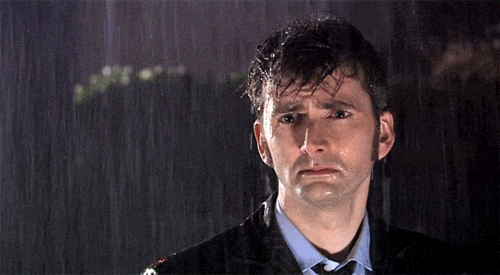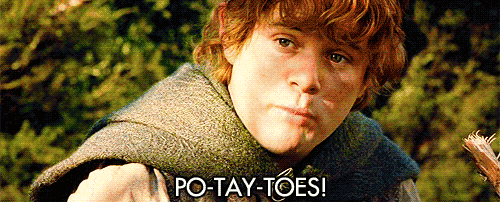Odd Words and Sayings Unique to British English
Is there another language besides English that is such a mess of dialects and colloquialisms? Does relocating barely 25 miles in non-English speaking countries mean that opening your mouth immediately identifies you as a foreigner to those parts? We’re sceptical about that; here’s some of the most delightfully odd words and sayings from (arguably) the home of English - from around the UK. Which are you keeping for your very own?
GIF via Giphy
Terms of endearment You’d be surprised just how many ways there are to be affectionate with someone in passing. The phrase generally starts with something like how are you or you alright or how’s it going, which is all fairly standard. But then you have a beautiful range of words to tack on, depending on where you are in the country/where you were born/who you’re with. For example, climb into a taxi, and you might be greeted with a where you off to, duck/flower/ petal/love/chicken/mate/kiddo? The human condition… Clomping together expressions that have to do with how we’re thinking, or feeling here. If you’re crying you could be roaring, beeling, skrikin, blarting, or greeting. Tired? That’s arrad, cassened, beazled, wanged out, or wabbit. In a bad mood? Then you are mardy, crabby, grizzling, maungy, or have got cob on, or gorra bag on. Or are throwing a paddy. We have a lot of words for this, for some reason...
Learning a new language? Check out our free placement test to see how your level measures up!
If you’ve got a headache, that’s a meagrim. Complaining, that’s chuntering, grizzling, or belly-aching. Chattling is gossiping, maungy is spoilt, and to be parky is to be fussy. Rawnish or clemmed is to be hungry, the opposite of which would be brossened - full up. If you are made up you are pleased, scuntered or reddened means embarrassed, and radgy means you’re angry. Pity the fool There are so many different ways to say this! An affectionate way to call someone stupid is referring to them as daft as a brush. And on a sliding, interchangeable scale of affection, a fool can be a piecan, twonk, ha’porth, barmpot, numpty, wazzock, dornack, or a bumbleklutz. Tight spaces We all have them (and if we don’t personally, we know someone who does). And in the UK, they’re called different things, depending on where you are. That passage down between houses (...) is referred to as a ginnel, snicket, ten-foot, twitten, twitchell, or jitty. Many a pub debate has broken down into passage discourse.

GIF via Giphy
Weather Because why wouldn’t there be a millions phrases for this in the UK? Mizzling is fine rain, haar even finer, siling it down means that rain’s quite heavy, as does puthering. After that rain you’d be soaking wet - or drookit, if it looks like it might rain, it’s black over Bill's mothers, and that would probably make it a dreich (miserable) day. We’re even miserable on hot days, though, when it’s described as mafting, so maybe don’t listen to us. Onomatopoeia? Or maybe not; these words just look like they could be. Fozy is soft or mouldy, foisty is damp, thrutch is to squeeze or crush, sheugh is the ditch by the side of the road, to dunch is to bump, to plodge is to paddle, and betwattled is gobsmacked. Favourites And this is hard, because there’s so many! Snecking means being nosy/having a look, if you want to know the answer to the important question of who’s making a cup of tea, you ask, who’s mashing? If something makes you go cross-eyed, in parts of the country that’s boss eyed. To jiffle is to fidget. Ah’ll go to t’ foot of our stairs means to be surprised. And finally, if you’re thirsty (for a drink…), how about some corporation pop - tap water?

GIF via Giphy
False Friends Because there are a lot of words to trip you up. Here’s just a couple: tates or taters for much of the UK (and Hobbits) means potatoes… but in London this also means cold. Bab in Birmingham could be up there under terms of endearment, but elsewhere it means sh*t - so be careful where - and how - you use it! And whereas gimp in some parts of the country means fool, well. If you don’t know what it means elsewhere in the world, we’d suggest looking it up on Urban Dictionary. Maybe not at work though. You have been warned.



